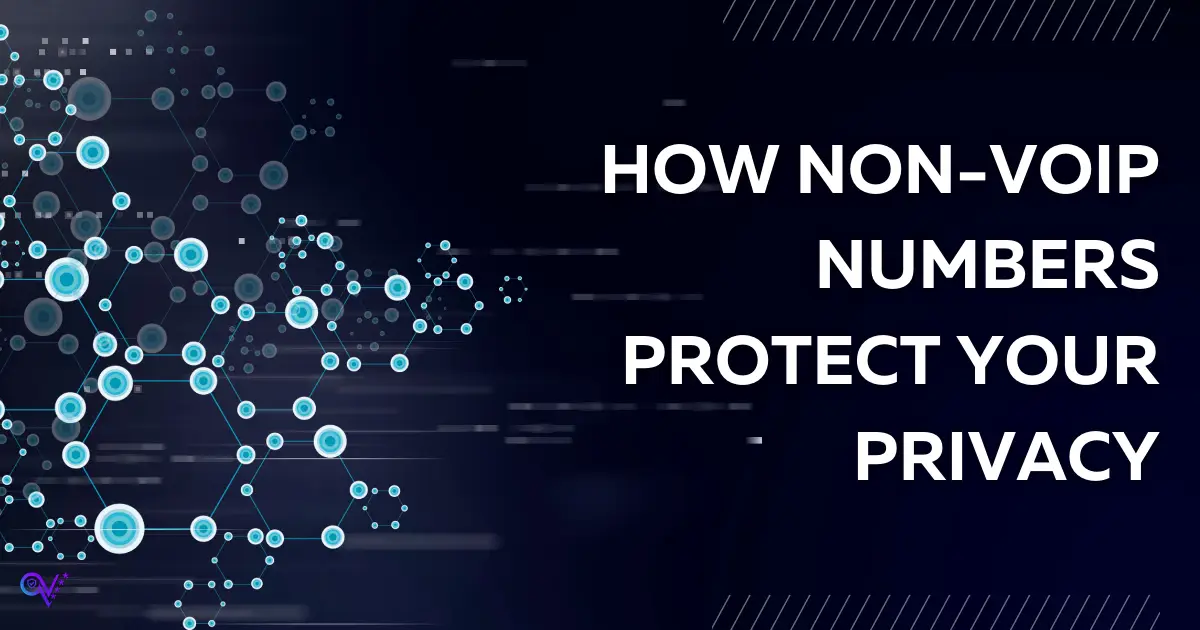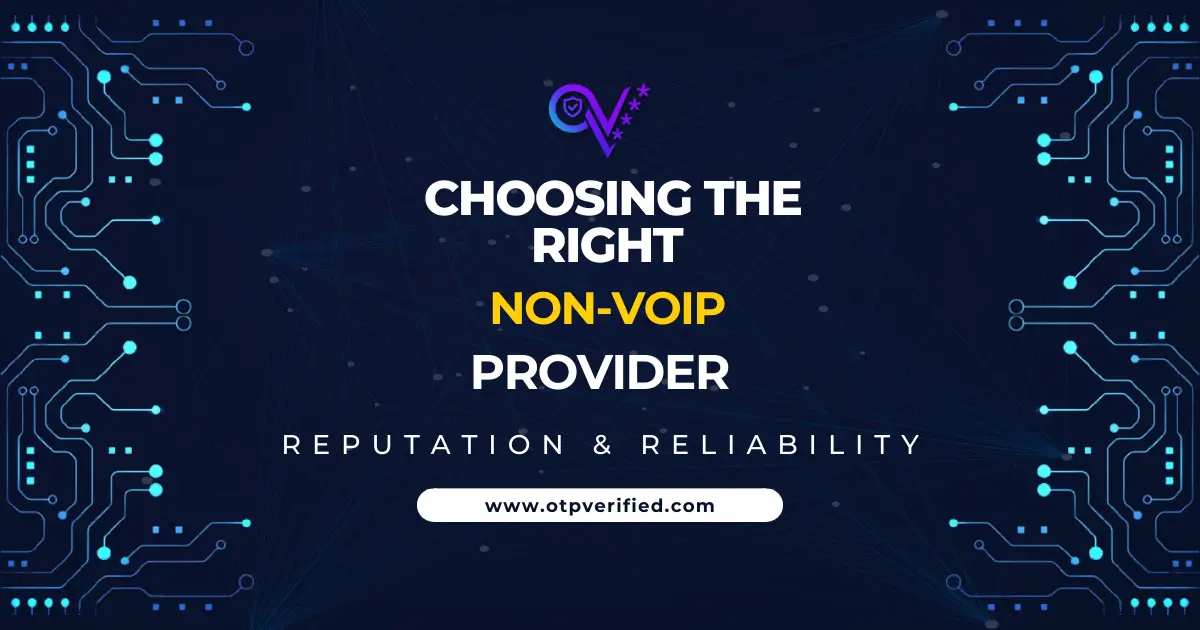
What is a Non-VoIP Number? A Complete Guide to Privacy & Online Protection
In today’s hyper-connected world, our phone numbers have become just as valuable as our email addresses or even our bank account details. Almost every app, website, or digital service asks for a number during sign-up. This requirement makes account verification quick and convenient, but it also creates serious risks.
A phone number is no longer just a contact point, it’s often tied directly to your personal identity. From two-factor authentication codes to banking logins, the number in your pocket can be a key to your entire digital life. That makes it a prime target for hackers, marketers, and even government surveillance. Data breaches, SIM-swapping attacks, and unauthorized marketing lists are all fueled by access to phone numbers.
The question becomes: how can you enjoy the convenience of digital services without constantly risking your privacy?
This is where Non-VoIP numbers step in. They provide a safer, more private way to verify accounts and protect your digital identity without putting your personal number at risk.
A Non-VoIP number is a phone number provided by a legitimate mobile carrier, connected to a physical SIM card, and recognized globally as a “true” mobile number.
To understand its importance, let’s compare:
VoIP (Voice over Internet Protocol) numbers are internet-based. Services like Google Voice, Skype, and other texting apps create “virtual” numbers that often come with restrictions. Many platforms block them for sign-up because they can be easily created and abused.
Non-VoIP numbers, on the other hand, are tied to actual mobile networks. They behave like standard cell phone numbers and are treated as more trustworthy and verifiable by online services.
In short:
VoIP numbers = Internet-based, temporary, less trusted.
Non-VoIP numbers = Carrier-based, permanent, trusted.
Because Non-VoIP numbers are recognized as “real,” they can be used on platforms that outright reject VoIP numbers for verifications.
The demand for Non-VoIP numbers has surged in recent years, and here’s why:
Account Verification
Apps like WhatsApp, Telegram, Gmail, Facebook, and many banking services require a genuine mobile number. Non-VoIP numbers are fully accepted for these verifications.
Protecting Your Primary Number
Instead of giving your personal number to every app or website, you can use a Non-VoIP number as a protective shield.
Reducing Spam and Robocalls
Sharing your personal number increases exposure to telemarketing lists. A Non-VoIP number absorbs the spam while your main number stays clean.
Bypassing Geo-Restrictions
Some services are region-locked. Non-VoIP providers often offer numbers from multiple countries, letting you access region-exclusive platforms.
Professional Use Cases
Freelancers, entrepreneurs, and business owners can keep work communications separate without paying for extra SIM cards or contracts.
Here’s how they create a privacy shield in your daily digital life:
Anonymity: You can sign up for marketplaces, dating apps, or social media platforms without tying your activity back to your real identity.
Identity Separation: Keep your personal, business, and freelance communications neatly divided.
Protection Against Leaks: If a Non-VoIP number gets exposed in a data breach, your actual phone number remains safe.
Safer Transactions: Selling or buying on Craigslist, Facebook Marketplace, or Fiverr becomes less risky when you don’t reveal your personal line.
In a time when even major corporations mishandle phone numbers, this separation is invaluable.

The need to protect personal numbers isn’t just theoretical. Several real-world incidents demonstrate why it matters:
Facebook–Cambridge Analytica Scandal
Millions of users’ private data, including phone numbers, were harvested and misused for political advertising.
Twitter 2019 Privacy Breach
Phone numbers provided for two-factor authentication were secretly used for targeted advertising
SIM Swapping Attacks
Criminals convinced carriers to transfer victims’ phone numbers to new SIM cards. The attackers then stole crypto wallets, social media accounts, and bank credentials.
Each case proves that your phone number is a weak link in your privacy chain if not properly protected.
Digital privacy has become a mainstream concern. Tools like VPNs, password managers, and encrypted messaging apps are now widely used. Within this ecosystem, Non-VoIP numbers are emerging as another essential layer of protection.
Several factors drive their adoption:
More Platforms Blocking VoIP Numbers: Social and financial apps increasingly reject internet-based numbers.
Growth of Online Freelancing: Professionals need separate, trustworthy numbers for clients.
Rising Global Privacy Concerns: With AI-powered spam and phishing attacks on the rise, users need new ways to shield their personal identity.
Industry analysts expect Non-VoIP numbers to become as common as disposable email services in the near future.
Privacy Protection
Keeps your personal number hidden from advertisers, scammers, and strangers.
Cost-Effective
Far cheaper than juggling multiple SIM cards or buying secondary phones.
Global Access
Gain numbers from different countries instantly, without needing to travel.
Multiple Account Management
Perfect for running multiple business, social media, or freelance accounts securely.
Convenience
Quick setup and easy integration with apps that require SMS verification.
Non-VoIP numbers aren’t just for tech-savvy individuals. They’re useful for:
Freelancers & Entrepreneurs: Keep work communication distinct from personal life.
Online Buyers & Sellers: Protect your identity while trading on marketplaces.
Social Media Managers: Run multiple verified accounts safely.
Privacy-Conscious Users: Anyone who wants to minimize their digital footprint.
People in High-Surveillance Regions: Those living in countries with limited digital freedom gain an extra layer of security.
Despite their clear advantages, Non-VoIP numbers do come with some caveats:
Not Universally Accepted
While widely recognized, certain platforms still block specific number ranges.
Not a Permanent Replacement
They are best for privacy and verification, but may not replace your primary number for long-term calling.
Provider Risks
Choosing an unreliable provider could expose you to scams or service disruptions.
The key is to use a reputable, transparent provider.

When shopping for a Non-VoIP number provider, keep these factors in mind:
Reputation & Reliability
Look for established providers with strong reviews.
Global Coverage
Access to numbers from multiple regions ensures flexibility.
Transparent Pricing
Avoid hidden fees and check renewal policies.
Platform Compatibility
Ensure the numbers work on essential platforms like WhatsApp, Gmail, and banking apps.
As digital privacy concerns grow, Non-VoIP numbers are poised to become mainstream privacy tools—on par with VPNs and two-factor authentication apps.
Emerging trends include:
AI-Driven Spam
Automated phishing calls are becoming more sophisticated, making personal numbers more vulnerable.
Expansion of Privacy Tech
As VPNs and password managers became household tools, disposable and Non-VoIP numbers are likely to follow.
Increased Regulation
Governments may impose stricter rules around number verification, which will further boost demand for Non-VoIP solutions.
Your personal phone number is one of the most sensitive pieces of data you own. It’s tied to your identity, your finances, and your online accounts—making it a high-value target for hackers, spammers, and even corporations.
Non-VoIP numbers offer a simple but powerful solution: they let you enjoy the convenience of modern digital services while shielding your real identity. From protecting privacy to reducing spam and enabling safer transactions, these numbers act as a digital buffer between you and the outside world.
In short, Non-VoIP numbers are no longer just a convenience; they are becoming an essential tool for anyone serious about protecting their online identity.